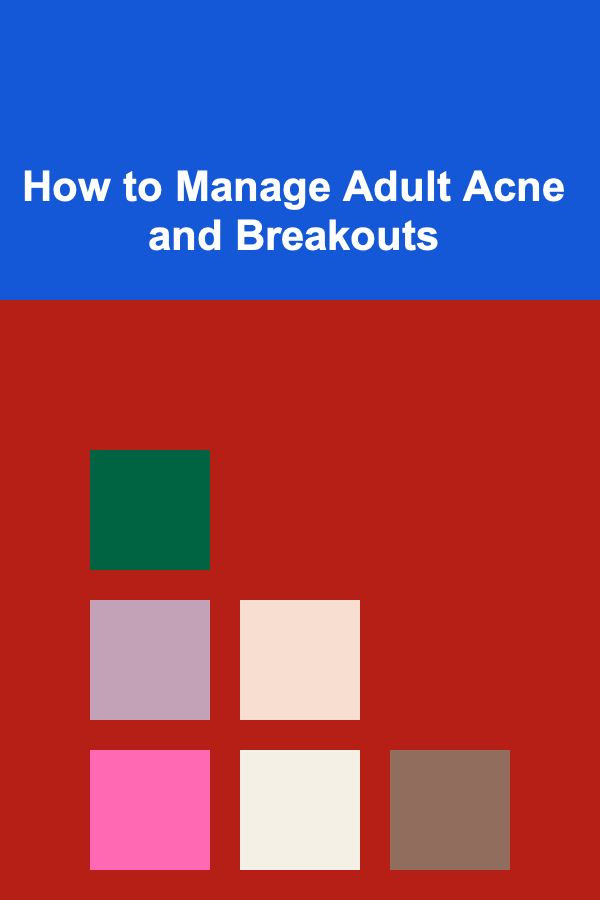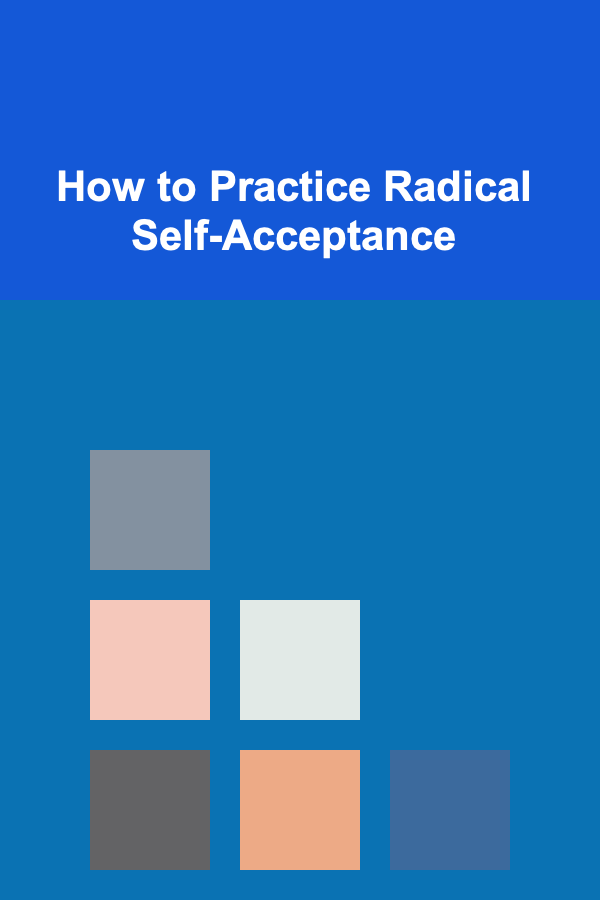
How to Manage Adult Acne and Breakouts
ebook include PDF & Audio bundle (Micro Guide)
$12.99$6.99
Limited Time Offer! Order within the next:

Acne isn't just a problem for teenagers. Many adults struggle with acne well into their 30s, 40s, and even 50s. Adult acne, though common, can be incredibly frustrating to manage, as it often affects those who thought they had outgrown their adolescent skin troubles. Factors like stress, hormonal changes, lifestyle choices, and skin care practices all contribute to adult acne. In this comprehensive guide, we will explore the causes of adult acne, the best ways to manage breakouts, and the effective treatments that can help you achieve clear, healthy skin.
Understanding Adult Acne
Adult acne is not just a continuation of teenage acne but can be caused by a variety of factors. While it might seem like a teenage rite of passage, acne in adults often presents differently. The breakouts are typically more concentrated along the lower half of the face, especially around the chin, jawline, and neck, which is a common sign of hormonal acne.
Common Causes of Adult Acne
-
Hormonal Fluctuations Hormonal changes are one of the most common causes of adult acne, particularly for women. Hormones, such as estrogen and testosterone, fluctuate during various life stages, such as menstruation, pregnancy, and menopause. These fluctuations can cause an increase in oil production, leading to clogged pores and acne.
- Menstrual Cycles: Women often experience breakouts before or during their period due to hormonal changes. The surge in progesterone and estrogen during the menstrual cycle can stimulate oil production in the skin.
- Pregnancy: During pregnancy, especially in the first trimester, hormone levels rise, which can lead to increased sebum production, clogging pores, and acne.
- Polycystic Ovary Syndrome (PCOS): Women with PCOS may experience irregular periods and hormonal imbalances that often lead to acne. Testosterone levels are elevated in women with PCOS, which can result in more oil being produced by the skin, leading to clogged pores and breakouts.
-
Stress Chronic stress is another factor that can trigger acne in adults. Stress stimulates the release of cortisol, the "stress hormone," which can increase sebum production and contribute to clogged pores. Additionally, stress often leads to unhealthy coping mechanisms like picking at the skin, which can exacerbate acne.
-
Diet and Lifestyle Choices What we eat can impact our skin health. Diets high in processed foods, sugars, and dairy have been linked to an increased risk of acne. Foods that are high on the glycemic index, like white bread, sugary snacks, and sugary drinks, can cause spikes in insulin levels, which may trigger an inflammatory response in the skin.
-
Skin Care Products and Cosmetics The use of harsh skincare products or those that clog pores (comedogenic products) can also cause adult acne. Certain oils, silicones, and alcohol-based products in skin care and cosmetics can irritate the skin or contribute to breakouts. It's essential to choose non-comedogenic skincare products that will not clog the pores.
-
Environmental Factors Pollution, humidity, and exposure to various environmental toxins can also contribute to adult acne. Pollution in the air can clog the pores and lead to inflammation. Moreover, constantly touching your face or using dirty items, like mobile phones and pillowcases, can also contribute to the spread of bacteria and dirt on your skin.
-
Medications Some medications, such as steroids, birth control pills, or certain antidepressants, can exacerbate acne. It's essential to consult with a healthcare provider before stopping or changing any medications if you suspect they are contributing to your acne.
How to Prevent and Manage Adult Acne
Managing adult acne is not only about addressing breakouts when they occur but also preventing new ones from forming. It requires a combination of good skincare practices, lifestyle changes, and, at times, medical intervention.
1. Follow a Consistent Skin Care Routine
A consistent, gentle skincare routine is essential for managing adult acne. Using the wrong products or not following a regimen can worsen breakouts. Here's a step-by-step guide for an effective skincare routine:
- Cleansing: Wash your face twice a day with a mild, non-comedogenic cleanser. Avoid harsh scrubs that can irritate the skin and lead to inflammation. Look for products that contain salicylic acid or benzoyl peroxide to help clear up breakouts.
- Exfoliation: Exfoliating once or twice a week can help remove dead skin cells that contribute to clogged pores. Opt for gentle chemical exfoliants like alpha-hydroxy acids (AHAs) or beta-hydroxy acids (BHAs), which are more effective and less abrasive than physical exfoliants.
- Moisturizing: Many adults with acne think they should skip moisturizing, but it's crucial to maintain a proper moisture balance. Look for oil-free, non-comedogenic moisturizers to avoid clogging the pores.
- Sunscreen: Sunscreen is essential to protect the skin from harmful UV rays. Choose a non-comedogenic sunscreen, preferably one that also contains ingredients like niacinamide or zinc oxide to help with acne and inflammation.
2. Choose the Right Acne Treatments
Several acne treatments can be highly effective for managing breakouts. If over-the-counter products don't work, it might be time to consult with a dermatologist to explore prescription options.
- Topical Retinoids: Retinoids, such as tretinoin, are potent ingredients derived from Vitamin A that help promote skin cell turnover. These can help prevent clogged pores and reduce acne lesions. They also provide anti-aging benefits by stimulating collagen production.
- Benzoyl Peroxide: Benzoyl peroxide is a well-known acne-fighting ingredient that works by killing acne-causing bacteria and reducing inflammation. It's available in varying strengths in over-the-counter products and prescriptions.
- Salicylic Acid: This beta-hydroxy acid (BHA) works by exfoliating the inside of pores, which helps clear out blockages. It can reduce the frequency and severity of breakouts by preventing pores from becoming clogged with excess sebum and dead skin cells.
- Oral Medications: For severe cases of acne that don't respond to topical treatments, oral medications may be necessary. Antibiotics, such as tetracycline or doxycycline, can reduce bacteria and inflammation. Birth control pills that regulate hormones can also help, especially in cases where hormonal fluctuations are the primary cause of acne.
- Chemical Peels and Laser Treatments: For those with persistent acne or scarring, professional treatments like chemical peels or laser therapy can help improve skin texture and reduce acne lesions. These treatments work by removing layers of dead skin or stimulating collagen production, which promotes healthier skin.
3. Focus on Stress Management
Managing stress is critical for acne control. Regular exercise, mindfulness practices like meditation or yoga, and ensuring you get enough sleep can significantly reduce stress levels. Stress-reducing activities help lower cortisol levels, which, in turn, can decrease the likelihood of acne flare-ups.
4. Make Dietary Adjustments
Diet plays a crucial role in skin health. While food alone cannot cure acne, adopting an anti-inflammatory diet can help manage breakouts. Consider the following:
- Reduce Refined Carbohydrates and Sugar: Cut down on sugary snacks, white bread, pasta, and other high-glycemic foods. These foods can trigger insulin spikes, leading to inflammation and more acne.
- Incorporate Omega-3 Fatty Acids: Omega-3 fatty acids, found in fish like salmon and sardines, as well as in flaxseeds and walnuts, have anti-inflammatory properties that may help calm acne flare-ups.
- Eat More Antioxidant-Rich Foods: Fruits and vegetables rich in antioxidants, such as berries, spinach, and kale, can help fight inflammation and improve skin health.
- Limit Dairy Intake: Some studies suggest that dairy, especially milk, may contribute to acne breakouts, though this relationship is still under investigation. If you suspect dairy is triggering your acne, consider eliminating it from your diet and seeing if your skin improves.
5. Avoid Touching Your Face
Avoid touching your face frequently, as the hands can carry dirt, oils, and bacteria that can clog pores and trigger acne. Try not to rest your face on your hands, and regularly clean your mobile phone, pillowcases, and makeup brushes to minimize the spread of bacteria.
6. Get Enough Sleep
Lack of sleep can increase stress levels and affect hormone balance, both of which can contribute to acne flare-ups. Aim for 7-9 hours of quality sleep each night to promote better skin health and overall well-being.
Conclusion
Managing adult acne can be a challenging and frustrating experience, but with the right skincare routine, lifestyle changes, and treatments, it is possible to control breakouts and achieve clear skin. Understanding the underlying causes of your acne is key to developing a personalized plan that works for you. Whether through topical treatments, stress management, or dietary changes, the steps outlined above will help you maintain a healthy, glowing complexion as you navigate adult acne.

How to Practice Radical Self-Acceptance
Read More
How To Understand the Basics of EV Motors
Read More
How to Master Freestyle Skiing Jumps and Grabs
Read More
How To Master 3D Printing for Custom Game Pieces
Read More
Mastering No-Dig Gardening: A Comprehensive Guide
Read More
How to Determine the True Cost of a Private Education
Read MoreOther Products

How to Practice Radical Self-Acceptance
Read More
How To Understand the Basics of EV Motors
Read More
How to Master Freestyle Skiing Jumps and Grabs
Read More
How To Master 3D Printing for Custom Game Pieces
Read More
Mastering No-Dig Gardening: A Comprehensive Guide
Read More